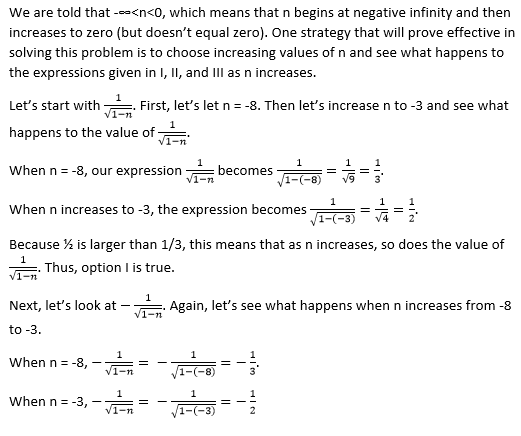All PSAT Math Resources
Example Questions
Example Question #1 : How To Simplify A Fraction
Find the root of
Can not be determined
The root occurs where 

This means that the root is at 
Example Question #152 : Fractions
Which of the following fractions is not equivalent to 
Let us simplify 
We can get alternate forms of the same fraction by multiplying the denominator and the numerator by the same number:
Now let's look at 


Therefore, 

Example Question #1711 : Psat Mathematics
|
Marker Colors |
Students |
|
Blue |
13 |
|
Pink |
10 |
|
Orange |
5 |
|
Brown |
5 |
|
Green |
7 |
The above chart shows the number of students in a class who chose each of the five marker colors available.
What fraction of the class selected a pink marker OR a brown marker?
To solve this problem, you must do three things: find out how many students selected a pink OR brown marker, make that a fraction with the total number of students in the class as the denominator, then simplify that fraction. Shown below:
Students who chose pink OR brown:
Pink: 
Total students:
Total students in the class:
Make it a fraction:
Simplify. To simplify a fraction, you must find the greatest common factor (GCF), then divide both the numerator and the denominator by the GCF. For 


The answer is 
Example Question #1 : How To Order Fractions From Least To Greatest Or From Greatest To Least
Which of the following is greater than 1/2 ?
2/5
6/11
9/19
8/17
4/9
6/11
There are two ways to deal with fractions. One way is to convert them all to decimals. (By using your calculator, divide the numerator by the denominator). Using this method all you would need to do is to see which is greater than 0.5. Otherwise to see which is greater than 1/2, double the numerator and see if the result is greater than the denominator. In B, the correct answer, doubling the numerator gives us 12, which is bigger than 11.
Example Question #1 : Fractions
Which of the following has the greatest value?
52%
4/7
5/8
65%
65%
If all are converted to decimals, 0.65 is the biggest.
Example Question #1 : Fractions
Which fraction falls between ½ and 3/4?
1/3
3/6
5/8
4/5
6/8
5/8
The easiest method is to put each of these fractions into a calculator, and then place them in order on a number line to see which value falls in between 1/2 = 0.5 and ¾ = 0.75. Without a calculator you must do long division to find the value of the numerator (top number) divided by the denominator (bottom number) for each fraction. You can actually eliminate answers b. and d. because they are equal to 1/2 and ¾ respectively. 4/5= 0.80, 3/6 = 0.5, 5/8= 0.625, 6/8 = 0.75.
Example Question #2 : How To Order Fractions From Least To Greatest Or From Greatest To Least
If Ben is taller than Jaime, Mary is taller than Ben, and Chris is taller than Mary. Who is the second tallest?
Ben
Jaime
Mary
Chris
Not possible to tell
Mary
Using math symbols to dictate height we find that Ben>Jaime, Mary>Ben, Chris>Mary. Putting these in order we have Chris>Mary, Mary>Ben, Ben>Jaime. This shows that Mary is the second tallest.
Example Question #161 : Arithmetic
Order the following fractions in descending order.
1/2, 2/3, 2/5, 3/4, 4/7
2/3, 4/7, 3/4, 1/2, 2/5
2/5, 1/2, 4/7, 2/3, 3/4
1/2, 2/3, 2/5, 3/4, 4/7
3/4, 2/3, 4/7, 1/2, 2/5
2/5, 1/2, 3/4, 4/7, 2/3
3/4, 2/3, 4/7, 1/2, 2/5
Method 1:
Find the common denominator (420) and convert each fraction to this denominator:
1/2 = 210/420
2/3 = 280/420
2/5 = 168/420
3/4 = 315/420
4/7 = 240/420
Now sort by numerator, largest to smallest.
Method 2:
Divide each fraction to obtain a decimal. Sort the decimals, largest to smallest.
Example Question #1 : Fractions
I and II only
I and III only
II only
I only
II and III only
I and III only
Example Question #1 : Fractions
Which of the following fractions is between 0.2 and 0.3?
The other three choices are larger than 0.3.
Certified Tutor
Certified Tutor
All PSAT Math Resources






































